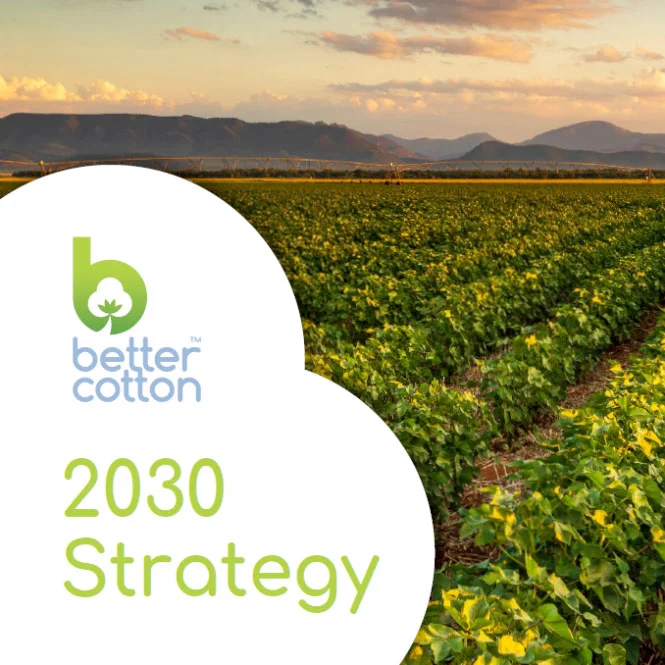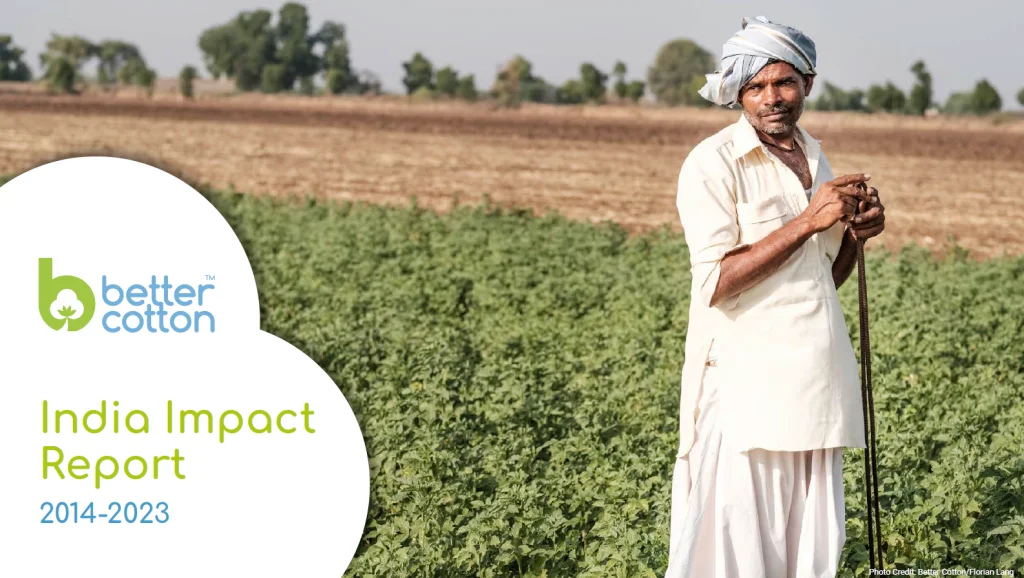- Who we are
- What we do
In just over 10 years we have become the world’s largest cotton sustainability programme. Our mission: to help cotton communities survive and thrive, while protecting and restoring the environment.
- Where we grow
Better Cotton is grown in 22 countries around the world and accounts for 22% of global cotton production. In the 2022-23 cotton season, 2.13 million licensed Better Cotton Farmers grew 5.47 million tonnes of Better Cotton.
- Our impact
- Membership
Today Better Cotton has more than 2,700 members, reflecting the breadth and diversity of the industry. Members of a global community that understands the mutual benefits of sustainable cotton farming. The moment you join, you become part of this too.
- Associate Membership
- Civil Society Membership
- Producer Organisation Membership
- Retailer and Brand Membership
- Supplier and Manufacturer Membership
- Find Members
- Member Monitoring
- Better Cotton Platform
- myBetterCotton
- Resources – Better Cotton Conference 2022
- Complaints
- Whistleblowing
- Safeguarding
- Get Involved in the Better Cotton Programme
- Thank you for contacting us
- Better Cotton’s Data Privacy Policy
- Log in
- Members’ Area
- Request for Proposals
- Better Cotton Cookie Policy
- Web Reference
- Measuring Cotton Consumption
- How to Implement the Chain of Custody Standard
- Resources – Better Cotton Conference 2023
- Certification Bodies Old
- Latest
- Sourcing
- Latest
The founding premise of Better Cotton is that a healthy sustainable future for cotton and the people that farm it is in the interests of everyone connected with it.
Let us help you find what you’re looking for
Results for {phrase} ({results_count} of {results_count_total})Displaying {results_count} results of {results_count_total}
As one of the world’s largest producers, and consumers, of cotton fibre, Brazil is a key country for BCI to continue to improve the uptake and flow of Better Cotton across the supply chain. We have published this series of questions and answers below to provide clarity on a variety of aspects of BCI’s programme in Brazil.
ABRAPA (Associação Brasileira dos Produtores de Algodão – the Brazilian Association of Cotton Producers) is our Strategic Partner in Brazil, and Better Cotton from Brazil is licensed under ABRAPA’s ABR Protocol. This protocol is successfully benchmarked against the Better Cotton Standard System.
Benchmarking is a formal process for comparing, calibrating and conferring one-way recognition of other credible cotton sustainability standard systems. This recognition enables farmers who comply with a successfully benchmarked standard system to market Better Cotton.
The vast majority of cotton farms in Brazil are medium and large farms, and the benchmarked ABR Protocol currently applies only to these farms. The average size of cotton cultivation on ABR-BCI farms in the 2019/2020 season was 3,498 hectares.
However, BCI and ABRAPA acknowledge the need to work with cotton growing smallholders in Brazil. In 2019, planning began for trainings of smallholders in Minas Gerais as part of a BCI licensing pilot. These were scheduled for March 2020 but were postponed to 2021 due to the COVID-19 pandemic. Once launched, ABRAPA is looking at replicating this pilot in the state of Bahia. ABRAPA’s state-based member associations already work with smallholders in the Catuti region of Minas Gerais, and the Guanambi region of Bahia.
It is not BCI’s role or responsibility to speak about issues related to soy or other crops in Brazil – our goal at BCI is to transform cotton production. However, we can speak about how the Better Cotton Standard System (BCSS) – and by extension ABR-BCI licensed farms – addresses sustainability issues in cotton farming that are often also cited in soy production, such as pesticide use, land use conversion and deforestation. See the questions and answers below for more details.
Yes. We recognise the value of social and environmental elements in a landscape and that these values must not be lost in the process of producing cotton. We also recognise that land use change comes with increased risks to biodiversity and other resources used by local people. That’s why we require BCI farmers to complete a High Conservation Value (HCV) assessment to identify, maintain and monitor those values early on so that they are not damaged by expanding cotton operations. This is part of our HCV approach that works to ensure farmers are respecting the rights of local communities, indigenous people and the environment.
This approach is outlined in Better Cotton Principles & Criteria 4.2.1 and 4.2.2 that all BCI farmers around the world, including ABR–BCI licensed farmers, must follow.
Beyond our criteria, ABR certification requires compliance with Brazilian environmental legislation. This means that, according to Brazilian law, even growers who only plant a small area of cotton must preserve 20-80% of the property. The percentage preserved depends on the biome in which the farm is located. For example, if a property is located in the Amazon biome, it must preserve 80% of its area. Brazil is made up of six biomes with different characteristics: Amazon, Caatinga, Cerrado (savanna), Atlantic Forest, Pampa and Pantanal.
All external audits of ABR-BCI farms consider the legislation of the biome in which the farm is located, and, most importantly, the licensing process is for the farm as a whole and not just for the area under cotton cultivation. Through the ABR audit and licensing process, all farms are visited annually. It should also be noted that no ABR-BCI licensed cotton farm is located in the legally-defined Amazon region.
In a tropical climate with intense pest pressure (boll weevil and white fly, in particular), a key challenge for Brazilian farmers is how to address the phase-out of harmful pesticides, as they work to reduce their overall pesticide use. Through our Strategic Partner, ABRAPA, we are helping cotton farmers in Brazil do this and find alternative methods for dealing with pests.
This starts with ABRAPA’s ABR Protocol which must uphold BCI’s current Better Cotton Principles and Criteria, including our increasingly stringent approach to the phase out of “Highly Hazardous Pesticides’, introduced in 2018 as part of a formal BCI Standard revision.
The Better Cotton Principle on Crop Protection requires that any pesticides listed under Stockholm and Rotterdam conventions and the Montreal protocol are not used. It also requires producers to phase out the use of any pesticide active ingredients and formulations that are known or presumed to be extremely or highly hazardous (acute toxicity) and carcinogenic, mutagenic or reprotoxic as per World Health Organization (WHO) and Globally Harmonized System of Classification and Labelling of Chemicals (GHS) classification. ABRAPA is currently updating its standard to align with these recent BCI requirements and supporting farmers as they seek viable alternatives for crop protection.
ABRAPA has set up five biological control factories, operated in collaboration with its state partners, to produce pest control products that are alternatives to more toxic offerings. The factories produce methods of pest control like natural enemies and entomopathogens (biological control with entomopathogens can be defined as the use of fungi, viruses and bacteria). One factory is located in Minas Gerais, one is in Goiás and three are in Mato Grosso, the largest cotton-producing state.
The development of the ABR standard was undertaken by ABRAPA without funding from BCI. Better Cotton Fast Track Programme (BCFTP) funding was used for a variety of activities, such as training materials, capacity building for ABRAPA and farmers on the Better Cotton Standard System (BCSS), worker training on decent work, and alignment of ABRAPA and BCI’s chain of custody system.
“Better Cotton’ means cotton that is better for the people who produce it, better for the environment it grows in and better for the sector’s future. BCI Farmers that produce “Better Cotton’ adhere to the seven principles defined in the BCI Principles & Criteria, including minimising the harmful impact of crop protection practices, enhancing biodiversity, using land responsibly, promoting decent work and promoting water stewardship. Sustainability is also a journey that doesn’t end when a farm is licensed – that’s why BCI Farmers commit to participating in a continuous cycle of learning and improvement.
BCI is committed to only making claims that are credible and able to be substantiated, which is why we describe Better Cotton as ‘more sustainable’ than conventionally grown cotton rather than stating that it is categorically “sustainable’. We are intentional and consistent across our communications about using “more sustainable’ in the place of “sustainable’ because this is more accurate and better captures the ethos of our approach.
Describing Brazil as “the largest producer of sustainable cotton’ is not in line with our position. We do say, however, that Brazil is the largest producer of Better Cotton because this is true, and we are proud of our partnership.
Learn more about Better Cotton in Brazil.


